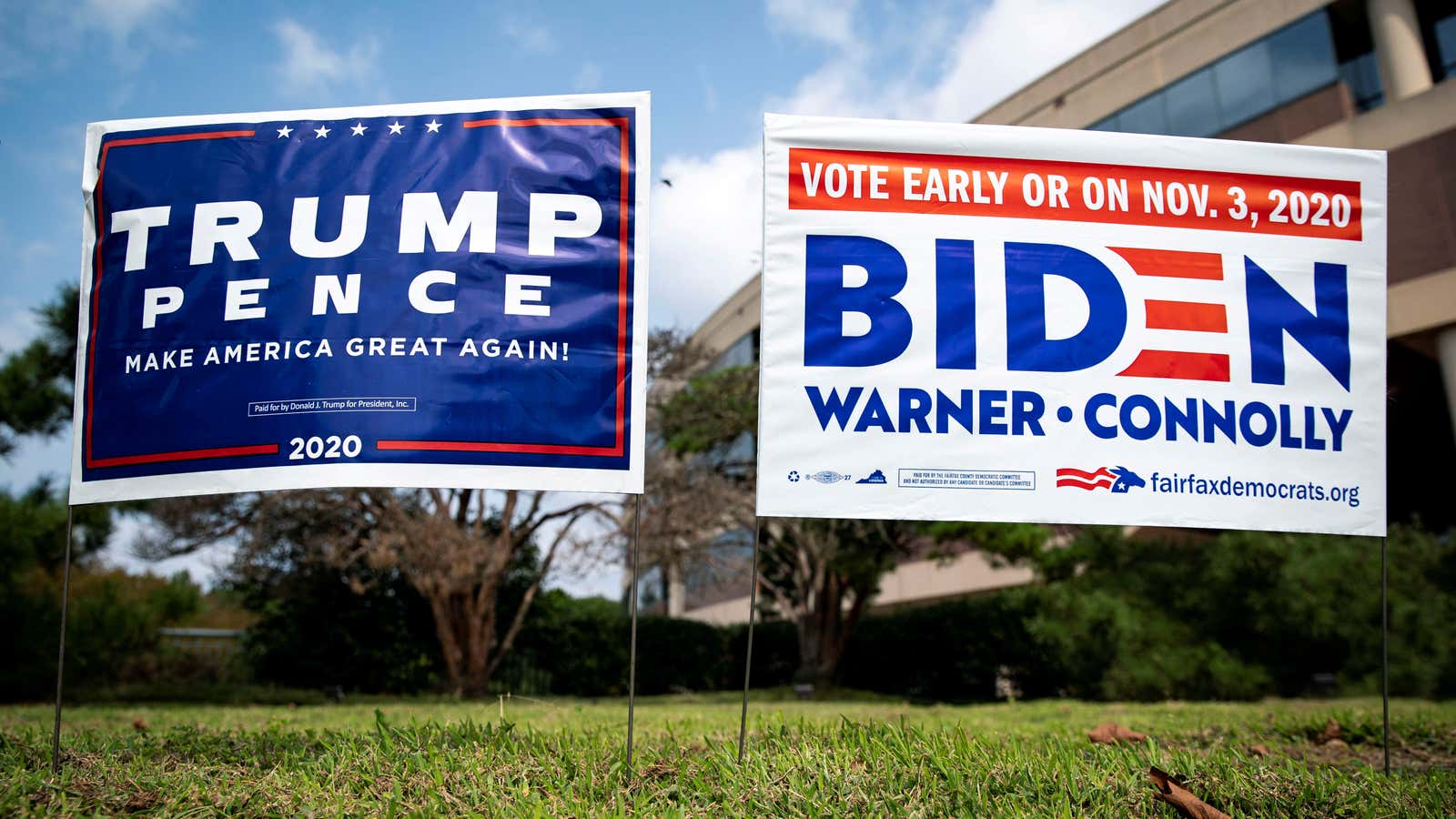Many Americans found out that Donald Trump would be their next president from a needle.
On election night 2016, the New York Times posted a live forecast showing the probability that Hillary Clinton or Trump would win the electoral college, based on a prediction model created by the Times’ data journalists. At the beginning of the night, the visual, which would become known as the “the needle,” showed an 85% chance of Clinton winning. But as results came in, Clinton’s chances began to dissipate. By 10 pm ET that evening, the needle pointed to a 95% chance of Trump winning the election.
As a result of those drastic swings, many election watchers maligned the needle (many still do). But the needle, which the Times has since used for US congressional elections, did what we should all do when we want to understand what the future holds: It started with an educated opinion about what would happen, and then it changed its mind.
The New York Times needle in 2016
Four years ago, the needle gave Clinton an 85% probability of winning based on pre-election day polls that suggested she was ahead in the race. That percentage was reasonable given how well presidential candidates with similar leads in the polls had done historically. But the needle was ready to quickly update that probability.
Before the night began, the needle’s model estimated the likely vote in counties and precincts across the US, based on their demographics. But the needle wasn’t stuck (heh) on its assumptions: If the actual results turned out different than expected, the model would then update its predictions for places with similar demographics, and the probability of Clinton or Trump winning would be adjusted accordingly.
And that’s exactly what happened. The election results in precincts and counties that reported early were surprisingly good for Trump. His chances then slowly rose throughout the night as more data came in showing him outperforming polls. (Polls had underestimated Trump’s chances because late-deciding voters swung unusually hard for him, and because turnout among white voters without college degrees supporting Trump was higher than most analysts predicted.)
Nate Cohn, one of the creators of the Times needle, points out that it isn’t anything new. The TV networks that call elections use similar models to project who will win a state before all of the votes have been collected. Like the needle, the networks’ models understand that just looking at the raw counts of votes early in the night can be deceiving—they may come from a particularly Democratic or Republican part of the state. Cohn argues that the needle just makes the kind of analysis that TV networks do more transparent.
The needle’s finer points
This year, the Times will use the needle a little differently. The newspaper announced yesterday that it won’t have a needle predicting the outcome of the election, but will have needles specifically for the outcomes of Florida, Georgia, and North Carolina. The Times said it wouldn’t offer a national guess due to uncertainty over the impact of mail-in voting, but feels comfortable projecting Florida, Georgia, and North Carolina because those states report the vast majority of their votes quickly, including mail-in ballots. If Biden wins any one of these states, Times modelers think he is likely to win the election.
One reasonable question about the needle is whether or not the starting probability should be based on polls; had the needle not started at 85% in 2016, perhaps it wouldn’t have given so many people a false certainty. This year, the Washington Post will also have an election-night model that estimates each state’s winner, but its baseline assumption is that all counties will vote as they did in 2016. That means Trump will start out as the favorite in WaPo’s model, with Biden gaining if results look different than they did four years ago. Unlike the Times, WaPo also won’t update its results until full counties report, whereas the Times makes updates when a full precinct reports.
Of course, there are those who say all election night modeling is a waste of energy. Why can’t we just wait a day or two for the official results? That’s not an unreasonable point. But for the millions of people who are paying close attention, the needle and similar election night forecasts represent a more informed way to understand the likelihood that Biden or Trump will win than watching pundits on TV.
